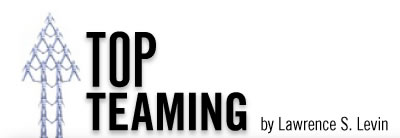Top Teams in Tough Times Never Waste a Good Crisis
You know by now what it is like to be tested when your business runs into what seems like the perfect storm of operating difficulties, bad sales projections, and business uncertainties. These issues, or others like them, conspire to create tough and uncertain times for even the best of teams who have the ongoing responsibility of simultaneously thinking of how to courageously grow a business while “bottom-proofing” it against a downturn.
Most leadership teams, 1-3 levels down, are smart people doing what is “business as usual” for good teams—or at least should be. They are committed and ultimately responsible for both setting and executing strategy, for ensuring financial results, and for securing a future for their employees – what we call “Leading in the Now, the New, and the Next.”
But tough times create new, but often-predictable paradoxes that require deliberate thinking about what leadership means. How do we bottom-proof the company and grow at the same time? How do we focus on innovation and growth while ensuring we’re “focusing on the basics” of our business? How do we maximize collaboration while restricting travel and meeting expenses? How do we grow our high-potentials and create bench strength while freezing key development activities?
Our experience working with leadership teams tells us that there are some very clear “Do’s and Don’ts” when being tested as a team. So a little advice:
Do’s:
- Recognize your default settings as individual leaders and as teams. Under stress, we typically go back to what we know and do well. We go operational. We focus on numbers. Sometimes we hammer the people under us to go heads down and focus on just the few critical things. And while all this may be necessary, we must stay aware of the longer-term costs for this default focus. So be sure you stay focused on your strategic imperatives, and what as a team you are FOR.
- Stay attuned to the critical intersections in the organization. Be very aware of the interdependencies you have both within your team and across your matrix of operational and functional experts, between the regional and corporate areas. Ensure, especially when under stress, that you ask what is important to others, affirm what is important to the organization both now and going forward, and ensure you make and keep your agreements. Building Relational Intelligence, even in the hard times, is what gives you a great and sustainable track record over time.
- Do remember that your leadership teams are “The Stewards of Organizational Talent.” Even while focusing on expense control, stay aware and alive about recognizing, developing, and coaching mission-critical people and identified high-potentials. How many times have we made it through a crisis to find we have no bench strength for growth?
Don’ts:
- Do not stop developing your teams. If you have made forward progress in building a team, or taking teams from well performing to Top Teams, keep the momentum going. Navigating through tough times is a team sport. All too often, we tend to hunker down and bottom-proof the organization without looking forward to the resources and mindset needed for future growth and innovation.
- Never waste a good crisis. Top Teams see the opportunities inherent in change and work to keep their confidence and excitement in the opportunities that exist in tough and shifting markets. One question to ask is “How do we use this burning platform to drive needed change?”
- Don’t stop talking to each other – not just reporting out, but also really actively dialoging about what is happening and what you are learning together. This is a time to build engagement, to really communicate about change, and to create a track record of success during tough times.
Your Top Teams carry with them tremendous collective intelligence, operating experience, and the ability to exert significant influence over the company’s mindset, focus, and performance. They have both the opportunity and obligation to navigate big change and make a significant difference in the future of the organization. And as the saying goes, “teams are tested in moments of stress.”
